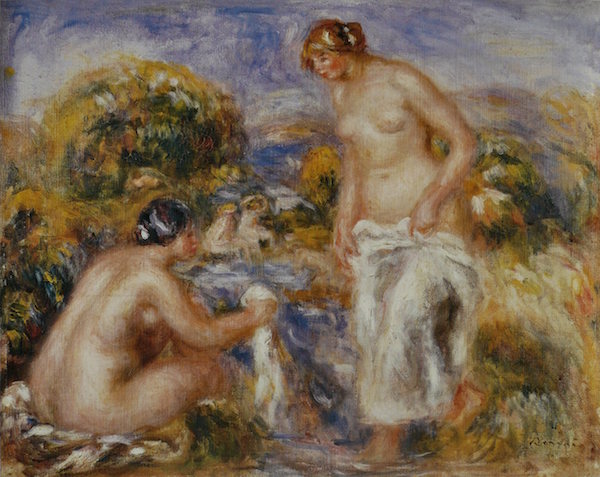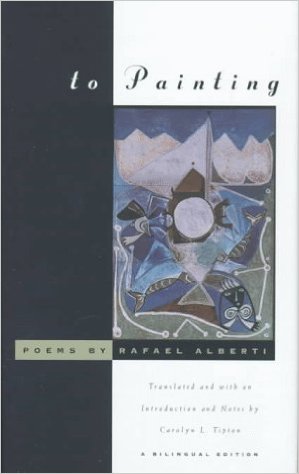Winner of the National Translation Award
Finalist: PEN West Award for Literary Translation
Chosen by Poet Laureate Robert Hass for his “Poet’s Choice” column in the Washington Post
Named in Pushcart Prize IV: Best of the Small Presses for the translation “Renoir”
To Painting: Poems by Rafael Alberti
translated and with notes and an introduction by Carolyn Tipton
A member of the Generation of ’27—a group of poets including Federico García Lorca, Jorge Guillén and Vincente Aleixandre, whose work brought about a literary renaissance in Spain—Rafael Alberti is one of the great poets of the twentieth century. To Painting is the collection many critics consider to be his best.
Alberti turned to poetry as a second art after initially training to be a painter. He won fame for early collections including Concerning the Angels (Sobre los ángeles) and Sailor on Land (Marinero en tierra) but never lost his love of his first discipline. To Painting, written during Alberti’s years in political exile from Spain, fuses his two great passions into an extraordinary tour de force of verse entirely dedicated to painting.
Each poem in this book is inspired by one of three different elements of painting: colors, the tools of painting and individual painters.
—Poems about color take the form of numbered lists, each item of which names a use to which a certain painter has put the particular color, a specific shade taken by the color in painting or in nature, or an association the poet has with the color.
—Poems dedicated to the various tools used in painting, such as the brush, the palette, and the retina, are written as traditional sonnets.
—Poems dedicated to individual painters imitate the style of that painter. The poem “Picasso”, for example, is free-form, with words spaced over the page in an unconventional manner.
In this bilingual edition, the poems in their original Spanish are presented alongside English translations. Also included are sixteen full-color reproductions of paintings referred to in the poems, as well as extensive explanatory notes and explanations.
Poet’s Choice Review of To Painting
by Robert Hass
The Washington Post, Jan 31 1999
The American Association of Literary Translators gives an award every year to the best book of literary translation into English, and the book they selected for 1998 is a remarkable one.
Rafael Alberti is one of the group of poets—the others were Federico Garcia Lorca, Jorge Guillen and Vicente Aleixandre—who shaped modern Spanish poetry. Alberti is still alive at the age of 98, and what many regard as his best book, A la pintura, a celebration in language of the art of painting, has been translated to stunning effect by Carolyn Tipton.
Some of the poems are about painters—Giotto, Botticelli, Titian, Van Gogh, Monet; some are about the elements of painting—the palette, the line, the brush, perspective; and some are about colors. Here are some sections from a poem called “Red”:
Red
1. I am morning’s first color, day’s last.
2. I wrestle with the green in fruit; I win.
3. With my brothers, I submit to the rigor — Giotto — of geometric rapture.
7. I congeal when my being solidifies in black.
12. Indistinct in certain nudes, diluted by the snow.
15. Purple through glass: goblets, bottles, tumblers warm with wine.
16. Come to me cadmium yellow: I want to be an orange, a lustrous sphere amidst the green.
21. In Goya, I’m diluted by the air.
24. All the way down to the rose rose of Picasso.
33. Think how I’m lost in the tiniest violet.
To Painting: Poems by Rafael Alberti is translated by Carolyn L. Tipton. The Spanish text is printed on the opposite page and the book contains sixteen color prints of some of the paintings Alberti writes about.
If you are thinking toward Valentine’s Day, this book would make a beautiful gift.
The excerpts from “Red” are from To Painting: Poems by Rafael Alberti, translated by Carolyn L. Tipton and published by Northwestern University Press. Copyright@1997.
A taste of To Painting

Renoir
Your colors
had long been dreaming—
rose wished to slip
down the breast
to the hip,
yellow, to be falling curls
(while the curls dreamed of falling
like roses),
indigo imagined itself
between thighs
diluted, it flowed,
and encircled the knees like water.
Silver dreamt
of olive groves,
deep red,
of wine
the shade of bougainvillea.
And black?
Did it die
in its sleep?
Excerpted from “Renoir” by Rafael Alberti
From To Painting: Poems by Rafael Alberti
translated by Carolyn Tipton

